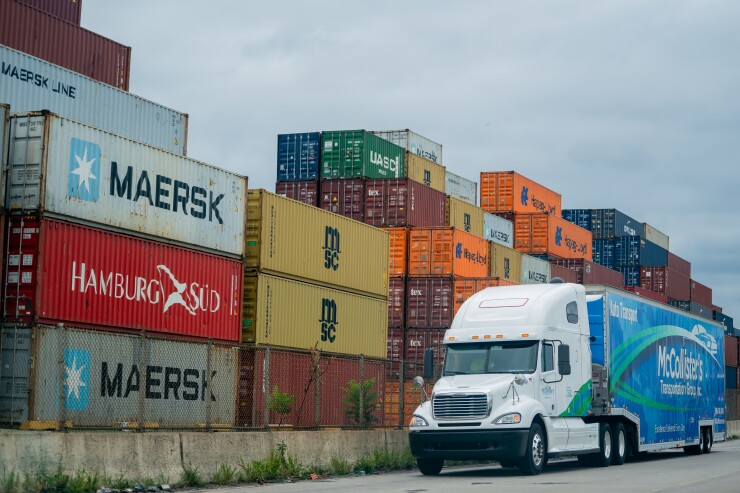- Key insight: Policy uncertainty continues to hamstring decision making amongst financial professionals.
- Supporting data: Amanda Allexon, a partner with Simpson Thacher & Bartlett, said she's encountered banks whose regulatory examination staff has been reduced by over 30%.
- Forward look: Despite uncertainty around trade and technology, deregulatory efforts like reductions in minimum capital levels are a notable boon to the banking industry.
NEW YORK — Banking industry experts say that trade policy swings under the Trump administration continue to hinder investment decisions, but are encouraged by the new push to ease the regulatory structure — so long as it's done thoughtfully.
During a panel discussion at American Banker's Most Powerful Women in Banking conference Wednesday, industry insiders spoke to a recurring frustration across finance: uncertainty, which hamstrings decision making in the sector. Meghan Shue, chief investment strategist at Wilmington Trust, said her message for the president would be to stop negotiating on trade barriers and give businesses some certainty so they can operate.
"The time for negotiation has passed. We've had enough of that," Shue said. "Let's set the policy and let businesses actually plan because if you give the rules of the road, small businesses and businesses in the U.S. in general … they're just so adept at adapting and finding a way. But when the rules are constantly changing, they freeze up, they don't spend, they don't make those investments."
Tasnim Ghiawadwala, global head of commercial banking at Citi, agreed the
"Our clients are sort of sitting by and wondering when it's going to settle down. When can we really invest?" Ghiawadwala said. "Some of the cost burdens that some of the policies might be creating for clients and some of the freezing of decision making — deciding whether to invest now, wait two years, wait five years. I think sometimes policies are created with multiple kinds of goals … but at the end of the day, it always falls on businesses [and] individuals to carry the impact."
Amanda Allexon, a partner at Simpson Thacher & Bartlett who specializes in bank regulatory issues, said she is fielding as many questions from clients about the administration's deregulatory efforts as she is about changing trade policies.
"There aren't that many bank regulatory attorneys out there in the world, but yeah, we've seen it tick up," Allexon said. "The environment has shifted dramatically in this past year, so we're getting a lot of calls from people … wanting to understand what's happening."
Despite the confusion, Shue said she's noticed optimism in the investor space about freeing up of capital, saying there's "more and more consensus around reducing some of the capital requirement ratio," referring to the
"Reducing some of the capital requirement ratios [like the] supplementary leverage ratio, could free up a relatively small amount, maybe $10 to $15 billion for banks," Shue said. "But underneath that, there's a lot more that could be freed up just from allowing subsidiaries to release some of their capital requirements and giving banks the ability to allocate capital more efficiently."
Shue says the uncertainty around tariffs is dragging down the volume of mergers industrywide.
"We've seen an uptick, a pretty decent uptick, in M&A value so far this year," she said. "Interestingly, M&A volume is still kind of flatlining, which, to me, says you've got a few big companies with cash on their balance sheets that are willing to make some big deals, but the small businesses are still handicapped by … the risk and uncertainty around tariffs. I think lower interest rates and a little bit more clarity on the trade front could unlock more of that capital markets activity, which would be a huge benefit to banks."
Panelists agreed that the
"I think the trend to sort of soften some of the regulation of the past is hugely welcome," Ghiawadwala said. "But I think we just need to make sure that we don't throw the baby out with the bath water."
Allexon also voiced concern that
"I've heard from people that I work with … they've lost 30% of their entire exam employee base," she said. "And I think that's going to lead to … challenges in effectively supervising institutions."
Allexon added that the administration's embrace of emerging technologies like crypto and artificial intelligence is also a welcome development, but that embrace will only be useful to the banking industry if it results in clear and actional rules for markets and participants.
"Finding the right balance between decreasing regulation and making sure that everything is appropriately accounted for with respect to these new technologies is really what's at stake," Allexon said. "Reasonable people are going to disagree. I think the positives are that this administration is the most open to new charters, new technologies of any that we've seen the last several … which is a change from the last four years."







